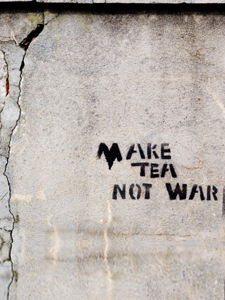Essayist Calls Tea

It may be difficult to believe this in the 21st century but barely 400 years ago, tea was thought by some British to be "pernicious," or harmful to society. Noted authors and religious leaders drew venomous conclusions and railed openly against the growing tea trade. For example, John Wesley, founder of the Methodist movement, was so disturbed by the increasing popularity of tea that, in 1748, he opined that his followers should completely abstain from tea because it "gives rise to numberless disorders, particularly those of a nervous kind." Apparently, the energy and clarity that tea can provide were too much for the good preacher.
Perhaps no one was more opposed to tea drinking than an English merchant named Jonas Hanway. Hanway wrote an essay on tea in 1757 in which he claimed that tea caused "paralytic and nervous disorders," particularly for women (whom he believed would have not only improved health but improved beauty) if only they would stop drinking the "liquid fire" called tea. He was also woefully misinformed about the differences between green and black tea and pretty much everything regarding the ways in which tea was harvested and processed. Few tea experts were around then to correct those parts of his thesis, which further propagated his mission of misinformation. Hanway's economic argument was the only part of the essay that had some merit. At the time, more than 150,000 pounds sterling was being paid to the Chinese for over three million pounds of tea (at about 22 pence per pound) annually. This was a tremendous outgo from the coffers of the country, which eventually led the royal court to scout territory in its holdings in India, where it would eventually grow its own source of tea. This way it could satisfy the growing appetite for tea while, more importantly, staving off the flow of silver away from the country. Clearly, the court did not find tea to be "pernicious." But when it came to money coming in, it seems Hanway didn't either. Hanway put great emphasis on what he perceived as the most dangerous aspects of tea: "the loss of health, the loss of time, the injury of morals, are not very sensibly felt by some, who are alarmed when you talk of the loss of money". However, Hanway was being rather disingenuous; he later cites that the East India Company tea trade helped the British economy by employing "six ships, and five or six hundred seamen, sent annually to China...bringing... in a revenue of three hundred and sixty thousand pounds, which, as a tax on luxury, may be considered as of great utility to the state." It seems as though Hanway is a proponent of his own earlier criticism, contradicting his supposed moral stance on tea once it became profitable. In 1758, an anonymous writer published "The Good and Bad Effects of Tea Consider'd" in which tea drinking was named the cause of working class women neglecting their spinning and knitting and spending the hard-earned dollars of their husbands on these "artful hussy drinks." Like Jonas Hanway, this writer contradicted himself by later stating that tea, drunk without milk or sugar, could have medicinal qualities. Then, from the always-astute pen of Dr. Samuel Johnson came a deliciously satirical review of Hanway's essay in "Literary Magazine." It pointed out that there was, in fact, no harm in drinking tea and that it promoted social expansion by bringing people together for "a gossip and a giggle". It also became apparent that tea was an excellent way to eliminate alcohol from children's diets. For decades, children and adults alike had consumed alcohol (usually beer or ale) because the quality of water was so poor that it often caused illness. Because boiling water is required to brew tea, it effectively killed germs and bacteria, thus preventing illness as it refreshed the body. By the 19th century, tea drinking was well established in Britain and a variety of charming accoutrements could be found in abundance. Fine porcelain cups, teapots, and tea dinnerware spawned other industries; the silver industry adapted to make new utensils for tea (sugar tongs, measuring spoons, and strainers), plus elaborate tea service sets which included pots, creamers, pitchers, and water ewers. The new tradition of afternoon tea cemented tea's popularity not only in Britain, but also around the world, thanks to many notable people of the time. Two of these were Anna Maria, the 7th Duchess of Bedford, who ate only a primitive menu of tea and toast, and later author Henry James who wrote that "under certain circumstances there are few hours in life more agreeable than the hour dedicated to the ceremony known as afternoon tea" (The Portrait of a Lady, 1881). As for the virulent Jonas Hanway, he made his fortune in sea trade despite pirate attacks, illness, and other dilemmas of the18th century. He became rich enough to become a philanthropist, establishing The Maritime Society for sailors, several hospitals, and other charities. And all the while, he continued to espouse his passionate moral opinions. His topics of interest expanded to include opposing the tipping of servants, advocating for solitary confinement for all prisoners, refusing naturalization for Jews, and, of course, keeping up the campaign against "pernicious tea". He died a lifelong bachelor in 1786. We assume there was no tea ceremony after his funeral arrangements. So why don't we all raise a cuppa in the name of tea? If you'd like to enjoy some "pernicious" tea in the style that Europeans did in the 1700's, we suggest checking out a lovely formosa oolong or our irish breakfast. We also have affordable and gorgeous alternatives to typical English bone china on our ceramics page.